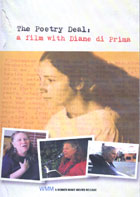
The Poetry Deal: A Film with Diana di Prima 2011
Distributed by Women Make Movies, 462 Broadway, New York, NY 10013; 212-925-0606
Produced by Melanie La Rosa
Directed by Melanie La Rosa
DVD, color, 27 min.
College - General Adult
Literature, Poetry, Women’s Studies, Cultural Studies
Date Entered: 08/03/2012
Reviewed by Dennis J. Seese, Reference Librarian, American UniversityThe opening sequence of The Poetry Deal: A Film with Diane di Prima is ignited by the blurry breathless rush of di Prima reading her poem “What Morning Is” in voiceover as the prowling Super 8 camera captures the on-rushing black & white New York City skyline through the window of a subway car. Those images mirror perfectly the ecstatic flurry of di Prima’s words, combining to provide a narrative momentum that propels director Melanie La Rosa’s cinematic homage to the revered Beat poet. In a sense—motion functions as narrative throughout, as disparate splashes of di Prima reading her work down the years in grainy archival footage and interview fragments with friends and contemporaries such as Michael McClure are ultimately connected together by the remarkable kineticism emanating from the core of Di Prima’s lush, intimate and powerfully wrought poems.
La Rosa’s self-professed “impressionistic” visual aesthetic is organic and faithful to the buzzing sense of boundary-less joy that made the Beats so special. This multi-faceted technical approach also subtly emphasizes the myriad roles di Prima has embodied so successfully throughout her life as a poet, artist, mother and handmade DIY self-publishing pioneer.
The film also includes interviews with modern writers like Michelle Tea that highlight the cultural impact di Prima’s presence as a woman producing acclaimed poetry within the hyper-masculine Beat milieu had on their work. This is one of many ways that issues of gender and motherhood are discussed in relation to di Prima’s life and career, culminating in the poignant reading of her poem “Song for Baby-O,” a letter to her then unborn child that unifies both strands of her identity and creative prowess.
The Poetry Deal is subtitled “a film with Diane di Prima” and it is instructive to note the word ‘with’ because the film is not necessarily about di Prima in the sense that it’s loaded with biographical details and viewers seeking those details should be advised at the outset that providing them is not the film’s primary intent. The inclusion of pertinent information such as di Prima’s editorial collaboration with LeRoi Jones on the journal “The Floating Bear” could have added to the film’s strength, giving viewers a further sense of the depth and reach of her influence.
Overall, The Poetry Deal lovingly celebrates the legacy of Diane di Prima and the influence she has exerted on poets all over the world. As an ancillary benefit, hopefully the film can function as a small measure of rehabilitation regarding the Beat Generation’s troubled legacy with women—whether embodied by the callous womanizing of Neal Cassady, Jack Kerouac’s stark abandonment of his daughter Jan or the overtly misogynistic comments (though later publicly repudiated) made at various times by William S. Burroughs—the Beats relationships with women, both in life and art, have often been uneasy and the female voice within their art often cloudy and subsumed. But in La Rosa’s film di Prima stands as a towering beacon of feminist light and energy that illuminates the shadow shrouding the Beats, giving voice and inspiration to women from that era and beyond.